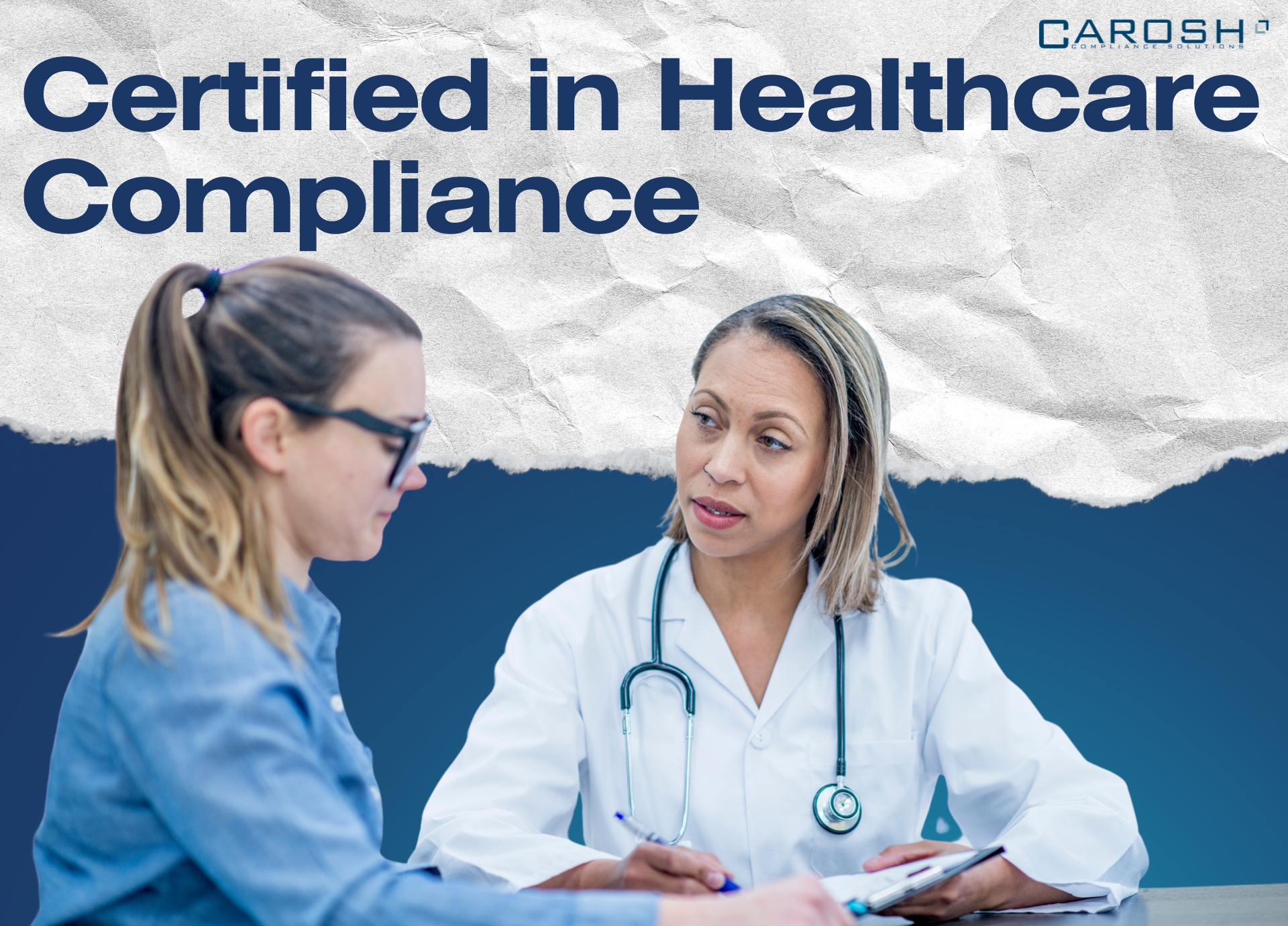
Table of Contents
Certified in Healthcare Compliance (CHC)
In healthcare’s complex world, protecting patient information is a pledge—a commitment upheld by professionals with healthcare compliance and HIPAA certifications. These certifications signify a thorough understanding and adherence to strict regulations that protect patient privacy and secure health information handling. The path to certification provides individuals with essential tools and knowledge to manage compliance complexities, transforming challenges into opportunities to boost patient trust and healthcare integrity.
Certified in Healthcare Compliance (CHC)
The Certified in Healthcare Compliance (CHC) Certification
The Health Care Compliance Association (HCCA) awards the Certified in Healthcare Compliance (CHC) certification as a mark of excellence and dedication. This certification is designed for professionals who lead the effort to ensure healthcare organizations comply with all regulations, thereby protecting healthcare integrity and patient privacy.

Qualifying for the CHC Certification
To qualify for this prestigious certification, candidates must have substantial experience in healthcare compliance. This experience prepares them for the practical challenges and nuances of the field. Candidates must then pass a comprehensive exam covering various domains such as compliance policy development and implementation, legal and regulatory issues in healthcare, risk assessments, and promoting a compliance culture through education and training. The exam also covers monitoring and auditing practices, compliance breach response and prevention, and enforcing compliance standards organization-wide.
Benefits of CHC Certification
Earning a CHC certification brings numerous benefits. It validates a professional’s commitment to the highest compliance standards in healthcare. This recognition can open new career opportunities, enhance professional reputation, and lead to salary advancements. It signifies a deep understanding of the legal and ethical frameworks governing healthcare, positioning the certified professional as a leader in ethical and transparent healthcare practices. The CHC certification is a pledge to excellence and integrity in healthcare compliance, reflecting a lifelong commitment to upholding these values.
HIPAA Certifications
Understanding HIPAA Certification in Healthcare
The world of healthcare compliance and patient data protection constantly changes, with the Health Insurance Portability and Accountability Act (HIPAA) being a central element. Unlike specific certifications such as the Certified in Healthcare Compliance (CHC) provided by the Health Care Compliance Association (HCCA), HIPAA certification follows a different route. No single, official body exists for HIPAA certification; instead, various private organizations offer training and certification programs. These programs target a wide audience involved with Protected Health Information (PHI), from healthcare professionals to IT staff.

The Diversity of HIPAA Certifications
HIPAA certifications meet various needs and levels of understanding. They range from broad overviews of HIPAA’s critical Privacy and Security Rules and breach notification requirements to more specific focuses. These can include IT professionals who secure electronic PHI or privacy officers responsible for patient data confidentiality. These programs aim to enhance knowledge and ensure compliance.
Benefits of HIPAA Certification
Gaining a HIPAA certification is beneficial for professionals, signifying their commitment to maintaining patient information privacy and security. This commitment is vital for complying with complex federal regulations and reducing data breach risks. HIPAA certification builds trust with patients and clients, underscoring a dedication to excellence in patient privacy protection and compliance adherence within healthcare’s evolving landscape.
Key Considerations
The Evolving Realm of Healthcare Compliance
The healthcare compliance landscape is continuously changing, with professionals diligently navigating HIPAA’s complex regulations and pursuing credentials like the Certified in Healthcare Compliance (CHC) certification. Offered by the Health Care Compliance Association (HCCA), the CHC certification is a beacon for those in the field, affirming their expertise in managing compliance programs within healthcare environments. This certification not only demonstrates a professional’s dedication to maintaining high compliance standards but also paves the way for career advancement and potential salary growth. It encompasses a wide range of knowledge areas, including compliance policies, legal regulations, risk assessment, and compliance standard enforcement.
HIPAA Certification Challenges
When it comes to HIPAA, the scenario shifts. Unlike the CHC, no single authority provides “HIPAA certification.” Instead, various private organizations propose training and certification programs that focus on HIPAA’s intricate Privacy and Security Rules and other regulatory aspects. These programs are designed for a broad spectrum of professionals, from those in healthcare and IT to privacy roles, all with the goal of enhancing their proficiency in safeguarding patient data.
The Importance of Due Diligence
It’s essential to note that the U.S. Department of Health and Human Services (HHS) does not officially recognize any HIPAA certification programs, highlighting the need for professionals to thoroughly vet these training options for their credibility and relevance. Both CHC and HIPAA compliance require a perpetual commitment to staying updated on regulatory changes and evolving best practices.
The Essence of Compliance Training
The core of compliance training, whether for CHC certification or HIPAA, is its application in the real world. True compliance extends beyond theoretical knowledge to include practical application, equipping professionals to address compliance issues effectively. This involves continuous learning, assessing the quality of training programs, and incorporating case studies and practical exercises into educational efforts.
For those charting a course through the complexities of healthcare compliance, understanding these key points provides a guide to certification and beyond. It highlights the necessity of thorough preparation, ongoing education, and the practical application of compliance knowledge in safeguarding patient information and adhering to regulatory standards.
Achieving certification in healthcare compliance and HIPAA marks a significant achievement. It showcases an individual’s commitment to maintaining the highest patient privacy and data protection standards. This certification is a clear sign of preparedness to navigate the changing world of healthcare regulations with expertise and assurance. For those aiming to stand out in the healthcare field, this certification acts as a key to numerous opportunities. It paves the way for impactful careers focused on enhancing patient care and organizational success, demonstrating a genuine dedication to making a positive difference in the healthcare industry.
Q&A
Q: What is HIPAA certification?
A: HIPAA certification involves completing a course of study that provides comprehensive knowledge on the Health Insurance Portability and Accountability Act (HIPAA), focusing on privacy, security rules, and best practices for compliance.
Q: Who should consider becoming certified in healthcare compliance and HIPAA?
A: Healthcare professionals, administrators, compliance officers, IT personnel, and anyone involved in handling patient health information should consider certification to ensure compliance with federal regulations and safeguard patient privacy.
Q: How does becoming certified benefit healthcare professionals?
A: Certification demonstrates a professional’s commitment to maintaining patient privacy, enhances career opportunities, and ensures that healthcare organizations comply with legal standards, reducing the risk of costly violations.
Q: What is the CHC certification?
A: The Certified in Healthcare Compliance (CHC) certification, offered by the Health Care Compliance Association (HCCA), recognizes professionals’ expertise in developing and managing healthcare compliance programs.
Q: Are there official HIPAA certification programs?
A: No, the U.S. Department of Health and Human Services (HHS) does not endorse any specific HIPAA certification programs. Various private organizations offer training and certification related to HIPAA compliance.
Q: What are the benefits of obtaining these certifications?
A: These certifications enhance a professional’s credibility, expand career opportunities, and signify a commitment to maintaining privacy and security of patient information.
Q: How can professionals stay updated with changes in HIPAA and CHC regulations?
A: Continuous learning and engagement in updated training programs are essential for staying informed about the latest regulatory changes and best practices.




